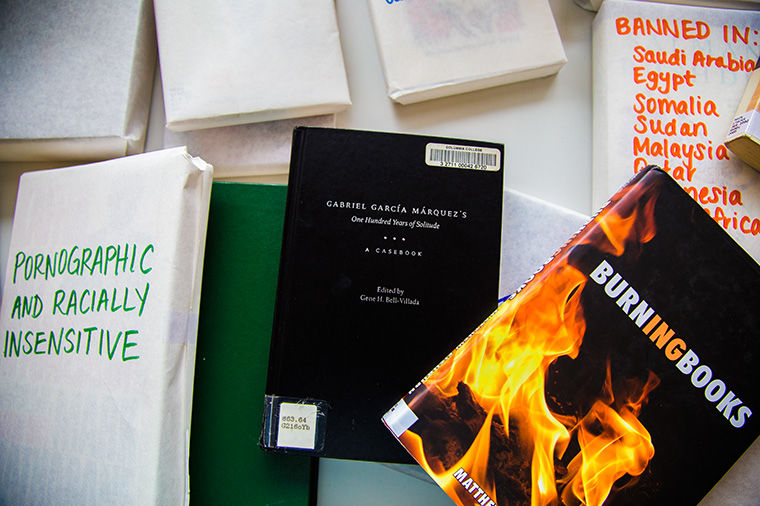Library celebrates historically censored, removed literature
The library hosted “Banned Books Bash” Sept. 28 to celebrate historically censored books, such as “The Color Purple” by Alice Walker.
October 3, 2016
Books that have been removed or restricted in libraries and schools were wrapped like presents in plain white paper and displayed across tables at Columbia’s “Banned Book Bash” event, hosted at the Library Sept. 28.
The banned book list included challenged classics—many written by authors of color. The list, constructed through reports received by the American Library Association’s Office of Intellectual Freedom whenever books are challenged at schools, libraries and the media, contained the 100 most frequently challenged books from 1990-1999. “The Color Purple” by Alice Walker and “The Bluest Eye” by Toni Morrison were listed for containing sexually explicit content and offensive language.
Molly Hart, student engagement coordinator at the Library South Campus Building in the 624 S. Michigan Ave. Building, created this year’s approach to the Banned bash in conjunction with week long Banned Book celebrations across the country.
“In the past, we [took] a small selection of banned books and [read] them out loud,” Hart said. “This year, we really wanted to look at diversity in banned books.”
According to a report from the American Library Association, 80 percent of the most controversial books published in 2014 included “diverse content.”
“What we find is that not only is it more difficult to get [diverse] books published, but once they are published, they tend to be censored much more frequently,” Hart said.
Enhancing the theme, Billie Holiday’s records played throughout the room. According to the ALA, her classic record “Strange Fruit” was instantly banned by all Southern radio stations.
“Every voice, no matter if you agree or disagree with it, deserves to be read,” said Bec Ucich, a junior creative writing major who attended the event. “If you are given a [specific] book or [ denied a book] , you can’t be exposed to [additional information.]”
According to another report by the ALA, parents were part of the 35 percent of initiators who challenged books in 2014.
“Half the time, it’s just because parents are disagreeing with the content,” said Cas Bodamer, junior creative writing major and Banned Books Bash attendee. “If kids are going to come up with their own world-views, then you might as well give them access to everything [to make their views] as well-rounded as possible.”
In addition to school boards and parents, the Department of Defense is a major advocate for banning books, citing the need for national security.
In September 2010, the DOD purchased and burned about 9,500 copies of the first uncensored printing of a memoir titled “Operation Dark Heart,” which described in detail the author, Lt. Col. Anthony Shaffer’s three months in Afghanistan.
Shaffer’s publisher, St. Martin’s Press, published a new edition of the memoir, which censored words to whole paragraphs. The information held back from the reader in this new edition was what the government told Shaffer was classified information, according to a lawsuit filed by the author.
“It’s always [heartbreaking] [to]hear about [burned] books,” Hart said. “When you destroy a book, you take the decision to learn away from someone. [That] is the very opposite of freedom.”








